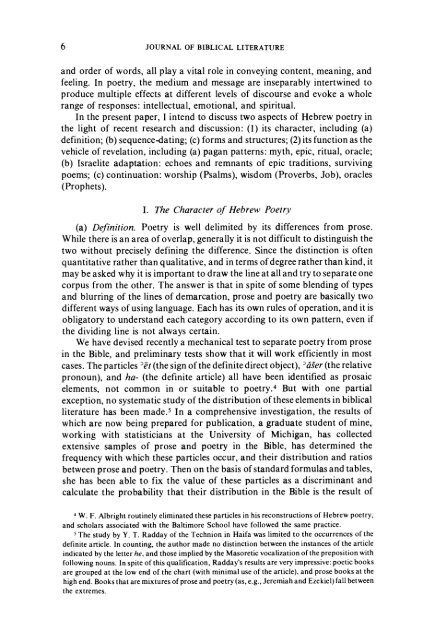POTTERY, POETRY, AND PROPHECY: AN ESSAY ON BIBLICAL ...
POTTERY, POETRY, AND PROPHECY: AN ESSAY ON BIBLICAL ...
POTTERY, POETRY, AND PROPHECY: AN ESSAY ON BIBLICAL ...
Create successful ePaper yourself
Turn your PDF publications into a flip-book with our unique Google optimized e-Paper software.
6<br />
JOURNAL OF <strong>BIBLICAL</strong> LITERATURE<br />
and order of words, all play a vital role in conveying content, meaning, and<br />
feeling. In poetry, the medium and message are inseparably intertwined to<br />
produce multiple effects at different levels of discourse and evoke a whole<br />
range of responses: intellectual, emotional, and spiritual.<br />
In the present paper, I intend to discuss two aspects of Hebrew poetry in<br />
the light of recent research and discussion: (1) its character, including (a)<br />
definition; (b) sequence-dating; (c) forms and structures; (2) its function as the<br />
vehicle of revelation, including (a) pagan patterns: myth, epic, ritual, oracle;<br />
(b) Israelite adaptation: echoes and remnants of epic traditions, surviving<br />
poems; (c) continuation: worship (Psalms), wisdom (Proverbs, Job), oracles<br />
(Prophets).<br />
I. The Character of Hebrew Poetry<br />
(a) Definition. Poetry is well delimited by its differences from prose.<br />
While there is an area of overlap, generally it is not difficult to distinguish the<br />
two without precisely defining the difference. Since the distinction is often<br />
quantitative rather than qualitative, and in terms of degree rather than kind, it<br />
may be asked why it is important to draw the line at all and try to separate one<br />
corpus from the other. The answer is that in spite of some blending of types<br />
and blurring of the lines of demarcation, prose and poetry are basically two<br />
different ways of using language. Each has its own rules of operation, and it is<br />
obligatory to understand each category according to its own pattern, even if<br />
the dividing line is not always certain.<br />
We have devised recently a mechanical test to separate poetry from prose<br />
in the Bible, and preliminary tests show that it will work efficiently in most<br />
cases. The particles 'et (the sign of the definite direct object), 'aser (the relative<br />
pronoun), and ha- (the definite article) all have been identified as prosaic<br />
elements, not common in or suitable to poetry.4 But with one partial<br />
exception, no systematic study of the distribution of these elements in biblical<br />
literature has been made.5 In a comprehensive investigation, the results of<br />
which are now being prepared for publication, a graduate student of mine,<br />
working with statisticians at the University of Michigan, has collected<br />
extensive samples of prose and poetry in the Bible, has determined the<br />
frequency with which these particles occur, and their distribution and ratios<br />
between prose and poetry. Then on the basis of standard formulas and tables,<br />
she has been able to fix the value of these particles as a discriminant and<br />
calculate the probability that their distribution in the Bible is the result of<br />
4 W. F. Albright routinely eliminated these particles in his reconstructions of Hebrew poetry,<br />
and scholars associated with the Baltimore School have followed the same practice.<br />
5 The study by Y. T. Radday of the Technion in Haifa was limited to the occurrences of the<br />
definite article. In counting, the author made no distinction between the instances of the article<br />
indicated by the letter he, and those implied by the Masoretic vocalization of the preposition with<br />
following nouns. In spite of this qualification, Radday's results are very impressive: poetic books<br />
are grouped at the low end of the chart (with minimal use of the article), and prose books at the<br />
high end. Books that are mixtures of prose and poetry (as, e.g., Jeremiah and Ezekiel) fall between<br />
the extremes.
















